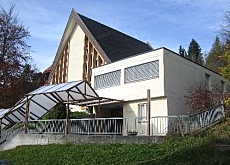O come, a few more of ye faithful

State-recognised churches in Switzerland are so desperate to stem the exodus of believers that they are even resorting to professional marketing techniques.
In Basel the Catholic Church is handing out flyers in the hope of boosting numbers and in Zurich a chapel has opened in a shopping centre.
People are increasingly unaware that Easter is the main Christian festival. In many western societies painted eggs and chocolate bunnies have taken over as the most significant Easter symbols, leaving little room for the resurrection of Jesus.
But this is symptomatic of a general trend: in many traditionally Christian countries such as Switzerland the number of people who feel a connection with the state-recognised Christian churches is plummeting.
In the city of Basel, for example, 50 per cent of the population do not consider themselves either Protestant or Catholic.
The Catholic Church in Basel has been particularly affected. In 1973 some 99,341 Basel residents were registered as members of the church, but this had fallen to 31,545 by the beginning of 2007.
And for Catholic and Protestant churches in Switzerland, which are financially supported by the cantons, fewer members means less income from taxes.
Flyers and adverts
The Catholic Church has responded by launching not only costing-cutting measures but also a publicity campaign.
At the end of March it started putting adverts in newspapers and distributing flyers around Basel.
But instead of addressing the central question of why people are deserting in such large numbers, the Catholic Church decided to focus on the positive and feature people explaining why they are returning to church.
Xaver Pfister, responsible for communication for the Catholic Church in Basel, said: “It is normal in Basel to leave the church. We wanted to turn this round and say that people can also come to church.”
Reto Müller features in one of the posters. The 32-year-old Catholic says he started going back to church despite not agreeing with many of its positions, such as its ban on women priests and its ostracism of homosexuals. “I no longer see any contradiction between that and my faith,” he said.
Pfister explains his hopes for the modest SFr10,000 ($8,200) campaign. “I don’t think many people will be motivated to actually come to church, but the campaign is a good way of raising public awareness,” he said.
Competition
Awareness is certainly necessary. The faith-based systems put forward by the state-recognised churches today face stiff competition from other forms of spirituality such as eastern philosophies and New Age beliefs.
“Customers” no longer come to the Catholic Church automatically but have to be targeted, which is why even the state-recognised churches are turning to modern marketing techniques.
“Marketing means communication,” said Pfister. “And dialogue with people was always one of the church’s main tasks.”
Flyers, adverts, chapels in temples of Mammon – the world has changed, and the church, to maintain its contact with people and income from taxes, is being forced to adapt.
swissinfo, based on an Italian article by Doris Lucini
Religion in Switzerland (2000)
42% Catholic (-7% from 1970)
35% Protestant (-12%)
11% Atheist (+10%)
4.3% Muslim (+4%)
0.2% Jewish (-0.1%)
In Switzerland, churches of the state-recognised religions – Catholic and Protestant – are financially supported by the cantons. This takes the form of a tax which is levied after the payer declares his or her religious affiliation on their tax form.
Church tax accounts for about eight per cent of taxpayers’ cantonal tax bills.
Taxpayers pay taxes to their community, canton and federal government.
The church tax is levied to cover church expenses and varies from canton to canton.

In compliance with the JTI standards
More: SWI swissinfo.ch certified by the Journalism Trust Initiative



You can find an overview of ongoing debates with our journalists here. Please join us!
If you want to start a conversation about a topic raised in this article or want to report factual errors, email us at english@swissinfo.ch.